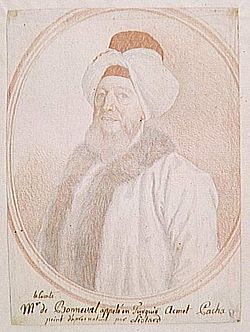- Claude Alexandre de Bonneval
-
"Djezzar" redirects here. For the commune in Algeria, see Djezzar, Algeria.
Claude Alexandre, Comte de Bonneval (14 July 1675 – 23 March 1747) was a French army officer who later went into the service of the Ottoman Empire, eventually converting to Islam and becoming known as Humbaracı Ahmet Paşa.
He was the descendant of an old family of Limousin; at the age of thirteen he joined the Royal Marine Corps. After three years he entered the army, in which he rose to the command of a regiment. He served in the Italian campaigns under Catinat, Villeroi and Vendôme, and in the Netherlands under Luxembourg, giving proofs of indomitable courage and great military ability. His insolent bearing towards the minister of war was made matter for a court martial (1704). He was condemned to death, but saved himself by fleeing to Germany.
Through the influence of Prince Eugene of Savoy he obtained a general's command in the Austrian army, and fought with great bravery and distinction against France, and afterwards against Turkey. He was present at the Battle of Malplaquet, and was severely wounded at Peterwardein. The proceedings against him in France were then allowed to drop, and he visited Paris, and married a daughter of Marshal de Biron. He returned, however, after a short time to the Austrian army, and fought with distinction at Belgrade.
He might now have risen to the highest rank, had he not made himself disagreeable to Prince Eugene, who sent him as master of the ordnance to the Low Countries. There his ungovernable temper led him into a quarrel with the Marquis de Prié, Eugene's deputy governor in the Netherlands, who answered his challenge by placing him in confinement. A court martial was again held upon him, and he was condemned to death; but the emperor commuted the sentence to one year's imprisonment and banishment. Bonneval was returned to Vienna, stripped of his rank, titles and honours, and exiled to Venice.
Soon after his release, Bonneval offered his services to the Turkish government, professed Islam, and took the name of Ahmed. He was made a pasha, and appointed to organize and command the Turkish artillery, eventually contributing to the Austrian defeat at Niš and the subsequent end of the Austrian-Ottoman war marked by the Treaty of Belgrade, where Austria lost Northern Serbia with Belgrade, Lesser Wallachia, and territories in northern Bosnia. In Constantinople, he met the young Giacomo Casanova, who was then a Venetian naval officer stationed there. He was also close friends with a well-respected local mullah, Ismail Pasha.
He rendered valuable services to the sultan in his war with Russia, and with the famous Nader Shah. As a reward he received the governorship of Chios, but he soon fell under the suspicion of the Porte, and was banished for a time to the shores of the Black Sea. He died at Istanbul in March 1747.
The Memoirs published under his name are spurious. See
- Prince de Ligne, Mémoire sur le comte de Bonneval (Paris, 1817);
- A. Vandal, Le Pacha Bonneval (Paris, 1885).
See also
- Franco-Ottoman alliance
References
- The Dictionary of Phrase and Fable (External link)
 This article incorporates text from a publication now in the public domain: Chisholm, Hugh, ed (1911). Encyclopædia Britannica (11th ed.). Cambridge University Press.
This article incorporates text from a publication now in the public domain: Chisholm, Hugh, ed (1911). Encyclopædia Britannica (11th ed.). Cambridge University Press.
Categories:- French military leaders
- 1675 births
- 1747 deaths
- Converts to Islam
- French Muslims
- Ottoman people of French descent
- Pashas
Wikimedia Foundation. 2010.


